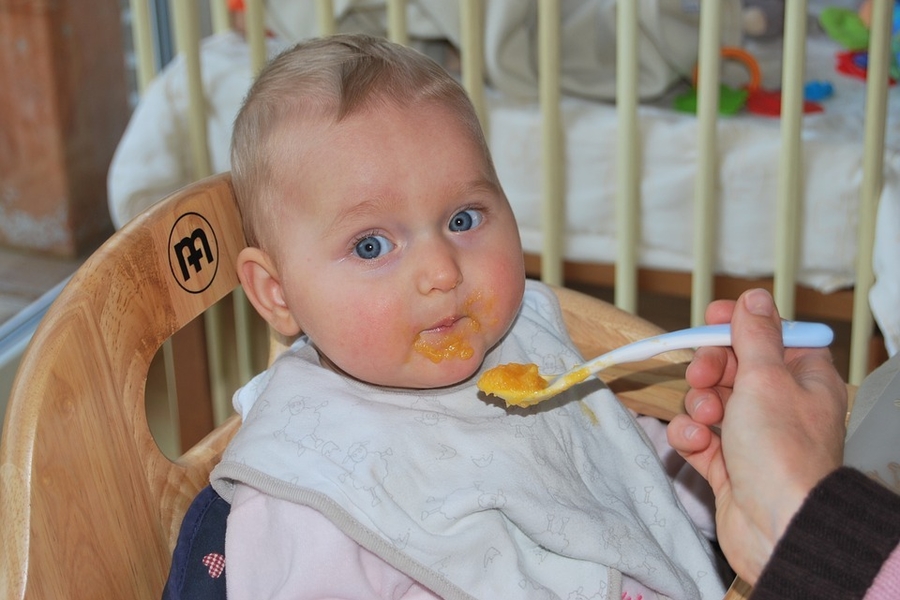
Introducing Solids To Your 6 Months Old Baby
16 May 2018 | 4 min Read
Anshu Bhojnagarwala (firsttimemommy)
Author | 67 Articles
I had read somewhere that when your infant starts eyeing other people’s food or stops drooling (which means she has learnt to swallow), you must be reassured that your infant is ready for solids. Believe me, waking up in the middle of the night 2-3 times for breastfeeding had me completely drained. So, I was more than ready to see these tell-tale signs in my daughter when she had not even turned 6 months.
But of course, ever a cautious mom, I first needed my daughter’s paediatrician go-ahead. I asked him, “When can I introduce solids to my baby?”
“The day she turns 6 months old. Not before that.”
What? Another few weeks of this nightmare. I thought.
I patiently ticked the days off on the big calendar till it showed me 21st February 2012. It was a big day for both me and my daughter.
I prepared rice kheer as it is the tradition to sweeten the child’s mouth first so that she always tastes sweet success in life. And then I gave her her first solid food, well it wasn’t actually a solid-solid but a vegetable soup. But it was enough for her. A few spoonful of carrot-spinach soup once a day to start with. Though she made a face initially but soon she lapped it up.
Once a day soup diet continued for one week. I tried my best to bring variation in her soup regime (though people advised me that an infant doesn’t have much taste for anything except milk). So, I would give her carrots, spinach, peas, capsicum, broccoli, tomato and avoided cauliflower and cabbage initially as they cause gas and indigestion.
In the second week, along with 1 meal of soup, I added another meal of a fruit – finely mashed papaya, grated apple and pear, mango pulp. As per the doctor’s advice, I hadn’t given banana to my daughter till she turned 1 as there is family history of asthma. And thereafter, I continued giving her banana only when I had made sure that the fruit doesn’t give her a cold.
Okay, so 2 meals taken care of. But it still it hadn’t made much of a dent in my breastfeeding schedule. In the third week, I actually started with the solids.
I gave her a home-made cerelac mixture of cereals, millets and pulses.
Soak 100 gms of whole wheat, rice, nachni (ragi) and split moong dal separately for a few hours. Drain the water and dry them out in the sun. When dry, roast them individually in a pan. Now grind them in a mixture. Pass them through a sieve. Lastly combine the different powders and store it in an air-tight container. Twice a day, give 1 or 2 spoonful of this mixture by adding boiled water or your expressed milk.
You can also introduce boiled water at 6 months. Give a sip of water after each meal and slowly increase her water intake. I started giving her boiled water with Tulsi leaves which continues till date.
These 4 meals in a day finally managed to ease some pressure off my breastfeeding regime. But you know what; carrying soups, mashed fruits and different kinds of meals every time I was travelling was no mean task. I am the first one to admit, I somehow yearned for the good old days when all I needed was a stole/cover and some privacy to feed my little baby.
What was your experience when you started solids for your baby? Do you have a story to share?
Disclaimer: The opinions expressed in the article are the personal views of the author. They do not necessarily reflect BabyChakra’s point of view. BabyChakra does not assume any responsibility for the views expressed in the article.
Also read: Worried About Introducing Solids To Your Baby?
Explore the entire collection of articles: Baby Food
A


Related Topics for you
Suggestions offered by doctors on BabyChakra are of advisory nature i.e., for educational and informational purposes only. Content posted on, created for, or compiled by BabyChakra is not intended or designed to replace your doctor's independent judgment about any symptom, condition, or the appropriateness or risks of a procedure or treatment for a given person.
